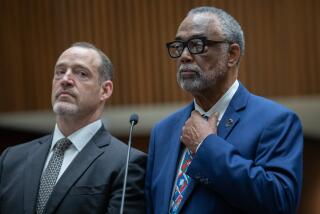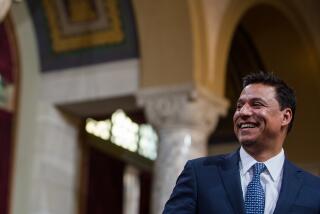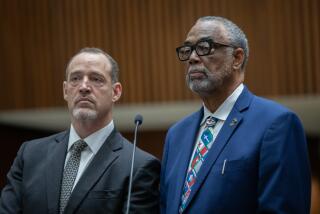Former Bell council members seek dismissal of corruption charges
- Share via
Six former Bell council members are asking a Superior Court judge to dismiss corruption charges against them, arguing that voters in the small Los Angeles County city gave them the authority to draw the annual salaries of nearly $100,000 that prosecutors say amounted to thievery.
When just over 300 voters went to the polls in 2005 and approved a little-noticed ballot measure declaring Bell a charter city, it allowed council members to get around state laws that limited how much they could be paid, defense lawyers say.
The argument, which will be presented in court Wednesday, is part of an effort to get the court to drop criminal charges against the half-dozen former council members, who were arrested in dramatic fashion last year. Two former city administrators, Robert Rizzo and Angela Spaccia, also face corruption charges.
In addition to the district attorney’s office, federal, state and other county agencies are looking into the actions of Bell officials.
The defense effort may be a long shot, however. When he bound them over for trial after a seven-day preliminary hearing last year, Judge Henry J. Hall, blasted the defendants and even suggested that prosecutors charge them with additional crimes.
While Oscar Hernandez, Teresa Jacobo and George Mirabal were still on the council, Hall ordered them to stay away from City Hall. The other defendants, Luis Artiga, George Cole and Victor Bello, were also told to stay away from City Hall, but they were no longer serving on the council.
Rizzo and Spaccia are charged with looting the city treasury by drawing enormous salaries, layering on extra benefits for themselves and lending city money to employees and business owners.
Rizzo was earning nearly $800,000 a year and had a total compensation package of about $1.5 million when he was fired. He stood to become the richest public pensioner in California, but his retirement pay has since been whittled down to the point where he’s likely to get $50,000 a year.
Cole’s attorney, Ronald Kaye, said the former council members shouldn’t be tainted by the alleged criminal acts of others.
“As defense attorneys, we realize this case has captured tremendous interest and become a symbol for government malfeasance, but we should not be judging people’s liberties and futures and family livelihoods by politics and public opinion,” he said.
In his brief, Kaye argued that the defendants’ crime was that they were getting paid more than the district attorney’s office thought was appropriate.
“This is unprecedented in the history of California,” Kaye said in an interview. “Nobody has ever done this, to try to prosecute somebody for making too much money on their salary. You kick these guys out of office if you think they make too much money. You don’t prosecute them.”
The former council members made most of their salaries not as council members, but for sitting on four city boards that prosecutors say seldom or ever met.
“They’re not charged with making too much money,” Deputy Dist. Atty. Edward Miller said, but that they “paid themselves illegal salaries. They knew they were paying themselves for no work.”
Miller argues that by 2010, council members were each earning $1,453 a month for serving on the boards. State law set compensation for one of the boards, the Community Housing Authority, at $200 a month, regardless of how often it met.
The other three boards rarely conducted business and, during one nine-month stretch, never even met, Miller said. The prosecutors said that after giving themselves raises in 2008, two of the boards never met and the other met only once.
Defense attorneys contend that sitting on the council in Bell was a full-time position, although council members had other jobs and — at most — met twice a month. Because Bell is a charter city, they argue, the city was not bound by all state regulations and could pay its council members whatever it wanted.
The defense attorneys also argued that testimony at the preliminary hearing showed council members did perform work for the boards, although the minutes were incomplete, and that the votes on their salaries took place in public meetings.
“Witnesses for the prosecution said these were hard-working, honest City Council members,” Kaye said.
Kaye also said that neither the city attorney nor the independent auditors who went through Bell’s books each year found problems with the council’s pay.
A report by the state controller’s office, however, severely criticized Bell’s auditor, Mayer Hoffman McCann, calling the firm’s work “a rubber stamp.”
No trial date has been set for the six council defendants or for Rizzo and Spaccia. All are free on bail.
More to Read
Sign up for Essential California
The most important California stories and recommendations in your inbox every morning.
You may occasionally receive promotional content from the Los Angeles Times.














